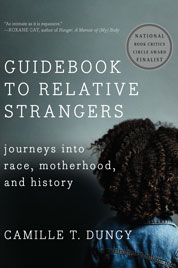 Guidebook to Relative Strangers
Guidebook to Relative Strangers
W.W. Norton & Company, June 2017
[nbsp]
An award-winning African American poet debuts in prose with a stunningly graceful and honest exploration of race, motherhood, and history.
[nbsp]
As a working mother whose livelihood as a poet-lecturer depended on travel, Camille T. Dungy crisscrossed America with her infant, then a toddler. As they travel, Dungy is intensely aware of how they are seen, not just as mother and child but as black females. With a poet’s eye, she celebrates the particular in the universal, such as a child’s acquisition of language and what to pack in a diaper bag. At the same time, her horizons are wide, as history shadows her steps everywhere she goes: from the San Francisco of settlers’ and investors’ dreams to the slave-trading ports of Ghana; from snow-white Maine to a festive, yet threatening, bonfire in the Virginia pinewoods.
[nbsp]
With exceptional candor, Dungy explores our inner and outer worlds—the multitudinous experiences of mothering, illness, and the ever-present embodiment of race—finding fear and trauma but also mercy, kindness, and community. Penetrating and generous, far-seeing and intimate, her prose is an essential guide for a troubled land.
[nbsp]
Praise for Guidebook to Relative Strangers
An elegant, meditative love letter to the life of the writer, the natural world, histories from which we cannot nor should not extricate ourselves, black womanhood, black motherhood, and the unabashed joy of raising up a black girl. . . . [A]s intimate as it is expansive.
—Roxane Gay, author of Hunger: A Memoir of (My) Body
Calm, lucid, and sturdy, Dungy’s account stares down the effects and unevenly distributed burdens of our shared past and present with clear eyes, full heart, and the kind of dedication to fact, feeling, and history that we truly need now, as ever.
—Maggie Nelson, author of The Argonauts
Reviews of Guidebook to Relative Strangers
Kirkus Reviews
[nbsp]
Paperback edition available August 8, 2018
Available in print and e-book: Amazon | Barnes&Noble
[nbsp]
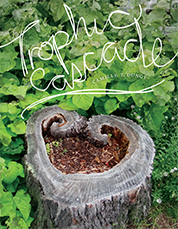 Trophic Cascade
Trophic Cascade
Wesleyan University Press, March 2017
[nbsp]
In this fourth book in a series of award-winning survival narratives, Dungy writes positioned at a fulcrum, bringing a new life into the world even as her elders are passing on. In a time of massive environmental degradation, violence and abuse of power, a world in which we all must survive, these poems resonate within and beyond the scope of the human realms, delicately balancing between conflicting loci of attention. Dwelling between vibrancy and its opposite, Dungy writes in a single poem about a mother, a daughter, Smokin’ Joe Frazier, brittle stars, giant boulders, and a dead blue whale. These poems are written in the face of despair to hold an impossible love and a commitment to hope.
[nbsp]
Praise for Trophic Cascade
Earthly and visionary, a soulful reckoning for our twenty-first century, held in focus through echoes of the past and future, but always firmly rooted in now. Each poem is a bridge in the music of a language that we believe and trust, that heals.
-Yusef Komunyakaa, author of Pleasure Dome
[nbsp]
This is the work of a feminist whose voice is confident, authoritative―it is a book that does not wonder about or meditate on so much as sing, declare, witness, order, elegize. Dungy’s poems manifest an uneasy self-perception, but―or I should say, and―their source is strength and love. The combination makes Trophic Cascade urgent and necessary.
-Joy Katz, author of All You Do Is Perceive
[nbsp]
Nature, motherhood, and racial violence intersect in Trophic Cascade, Camille T. Dungy‘s fourth poetry collection. Dungy… demonstrates her mastery of synthesis: fact, observation, and revelation mingle in perfect proportions. Trophic Cascade frequently bears witness—to violence, to loss, to environmental degradation—but for Dungy, witnessing entails hope.
—Harvard Review
[nbsp]
Reviews of Trophic Cascade
The Rumpus
Bustle
[nbsp]
Available in print and e-book: Amazon | Barnes&Noble
[nbsp]
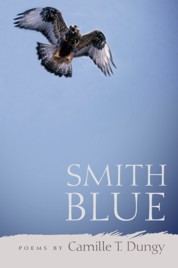 Smith Blue
Smith Blue
Winner of the 2010 Crab Orchard Series in Poetry Open Book Prize
Southern Illinois University Press, June 2011
[nbsp]
Smith Blue offers a survival guide for the modern heart as she takes on twenty first-century questions of love, loss, and nature. From a myriad of lenses, these poems examine the human capacity for perseverance in the wake of heartbreak; the loss of beloved heroes and landscapes; and our determination in the face of everyday struggles. The poems explore the dual nature of our presence on the planet, juxtaposing the devastation caused by human habitation with our own vulnerability to the capricious whims of our environment. In doing so, they reveal with fury and tenderness the countless ways in which we both create and are victims of catastrophe.
[nbsp]
This searing collection delves into the most intimate transformations wrought by our ever-shifting personal, cultural, and physical terrains, each fraught with both disillusionment and hope. In the end, the book demonstrates how we are all intertwined, regardless of race or species, living and loving as best we are able in the shadows of both man-made and natural follies.
[nbsp]
Praise for Smith Blue
Exquisite moments of intimacy caught in the meshes of history, of human depredation registered in language as plainspoken as it is rich in implication, Smith Blue by Camille Dungy is a gorgeous and powerful book, one of the best I’ve read in recent years.
—Alan Shapiro, author of Old War
[nbsp]
These are large, open-hearted lyrics about love: its pleasure, its neglect, loss and remembrance. Love here is not just parental and fraternal or of lovers and husbands, but a love for butterflies, things and their places. With a subtle variety yet balance of line, these are not ponderous pronouncements, but the voice of a graceful wondering about the world and the way we carry on.
—Ed Roberson, author of City Eclogue
[nbsp]
Loss inhabits these poems—palpable, less spiritual than common though no less devastating, spoken by one not afraid ‘to hear what quiet really sounds like.’ And what has been lost?—lovers, landscapes, poets, none replaceable with the easy distractions of iPods or NPR. What remains? Words. Lyrically adept yet coolly self-conscious, these poems engage loss to “recall / how we smelled before this end was begun.”
—Michael Waters, author of Darling Vulgarity, finalist for the Los Angeles Times Book Prize
[nbsp]
Reviews
Molly Spencer. “One/Then one/Then two: A Review of Camille Dungy’s Smith Blue.” http://www.flycatcherjournal.org. January, 2013.
[nbsp]
Press
Hiroko Masuike. Poetry Slams slide show. The New York Times. October 7, 2011.
[nbsp]
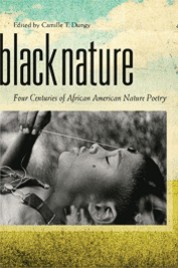 Black Nature: Four Centuries of African American Nature Poetry
Black Nature: Four Centuries of African American Nature Poetry
Edited by Camille T. Dungy
University of Georgia Press, December 2009
[nbsp]
Black Nature is the first anthology to focus on nature writing by African American poets. Camille T. Dungy has selected 180 poems from 93 poets that provide unique perspectives on American social and literary history to broaden our concept of nature poetry and African American poetics. This collection features major writers, such as Phillis Wheatley, Rita Dove, Yusef Komunyakaa, Gwendolyn Brooks, Sterling Brown, Robert Hayden, Wanda Coleman, Natasha Trethewey, Nikki Giovanni, and Melvin B. Tolson, as well as newer talents, such as Douglas Kearney, Amber Flora Thomas, Major Jackson, and Janice Harrington.
[nbsp]
Included are poets writing out of slavery, Reconstruction, the Harlem Renaissance, the Black Arts Movement, and late twentieth- and early twenty-first-century African American poetic movements. Black Nature brings to the fore a neglected and vital means of considering poetry by African Americans and nature-related poetry as a whole.
[nbsp]
Awards
Winner of the 2010 Northern California Book Award Special Recognition Award
2010 NAACP Image Award Nominee
[nbsp]
Press
View a symposium, held March 19, 2010 at UC Berkley, of poets and academics discussing the publication of Black Nature.
“‘Black Nature’: Poems of Promise and Survival.” Interview with Renee Montagne of NPR’s Morning Edition. April 19th, 2010.
[nbsp]
Praise for the anthology
Just as nature is too often defined as wilderness when, in fact, nature is everywhere we are, our nature poetry is too often defined by Anglo-American perspectives, even though poets of all backgrounds write about the living world. By creating an anthology of nature poetry by African American writers, poet and editor Dungy enlarges our understanding of the nexus between nature and culture, and introduces a “new way of thinking about nature writing and writing by black Americans.” African American poets describe the need for practical knowledge of the wild to survive, the toil of working the land, and moments of spiritual communion with nature’s countless manifestations. Dungy provides an arresting introductory overview of 180 poems by 93 poets, and incisive essays accompany each thematic grouping. This analysis is dynamic and crucial, but the poems, beginning with Lucille Clifton’s “the earth is a living thing,” are ravishing. Dungy’s unique, enlightening, and heart-opening anthology embraces George Moses Horton, who lived as a slave, and today’s award-winning Cyrus Cassells, haiku by Richard Wright, and poems funny, smart, sexy, devastating, and exquisite by Nikki Giovanni, Janice N. Harrington, Yusef Komunyakaa, Carl Phillips, and their many resounding peers, each expressing provocative perceptions of the great tide of existence.
—Donna Seaman, Booklist Starred Review
[nbsp]
Dungy has compiled what might have taken a lifetime to assemble, yet here it is at this moment when our culture is assessing both its relationship to the natural world and its relationship with its black citizens. The timing could not be better for such a comprehensive look at what black poets have contributed to our understanding of nature. What excites about this anthology is that it is not only the richest and most comprehensive collection of poems by black poets I have read, it is the richest and most comprehensive collection of poems about nature that I have read. I believe the book should be widely read, taught, and talked about.
—Alison Hawthorne Deming, author of Rope
[nbsp]
With extraordinary insight and substantial creative vision the rich synthesis of this anthology offers a strikingly original contour to the seasons of Black poets and poetry. The critical wisdom accumulated here is as important as the beautifully structured cycles that Dungy uses as landscaped categories to contain these important poems. The methodology here is as graceful as it is rigorously intelligent. Dungy’s anthology is a major contribution to twenty-first century Black Studies.
—Karla FC Holloway, author of BookMarks: Reading in Black and White–A Memoir
[nbsp]
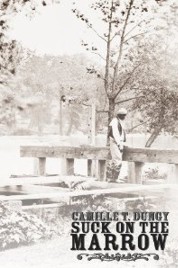 Suck on the Marrow
Suck on the Marrow
Red Hen Press, January 2010
[nbsp]
Set in Virginia and Philadelphia during the mid-19th century, Suck on the Marrow traces the experiences of self-emancipated bondswomen, kidnapped Northern-born blacks, free people of color, and the slaves of a large plantation and small household. The interconnected narratives of six fictionalized characters use traceable dates, facts, and locations to investigate moving aspects of American history. These poems explore the interdependence between plantation life and life in Northern and Southern American cities, and the connections between the successes and struggles of a wide range of Americans, free and slave, black and white, Northern and Southern.
[nbsp]
Awards
Winner of the 2011 American Book Award
Winner of the 2011 Northern California Book Award in Poetry
Silver Medal Winner in Poetry at the 2011 California Book Awards
2011 NAACP Image Award Nominee
Finalist for the 2011 ForeWord Magazine Book of the Year Award
Finalist in 2011 for the The Balcones Prize
[nbsp]
Interview
“Small Press Spotlight: Camille T. Dungy.” Interview with Rigoberto González on the National Book Critics Circle’s blog Critical Mass, April 6th, 2010.
[nbsp]
Reviews
“Remembering Mine: Suck on the Marrow by Camille Dungy.” www.forharriet.com. December 16th, 2010.
Tess Taylor. “Haunted History.” barnesandnoblereview.com. October 4th, 2010.
James Benton. rattle.com. August 10th, 2010.
[nbsp]
More praise for the collection
Camille Dungy’s important new collection, Suck on the Marrow, explores the lives of African Americans in the 19th century, illuminating parts of slave and free black experience that are often overlooked. Plainspoken and unflinching, these poems enter the interior landscapes of the characters’ psyches to examine the nature of desire and longing and loss. With restraint and wry wit, Dungy shows us these things underscored by ownership and commodity. Foregrounding the stories of people for whom fewer records have been left, Suck on the Marrow offers us a fuller view of our collective American experience.
—Natasha Trethewey
[nbsp]
Camille Dungy’s Suck on the Marrow exhumes a troublesome history through imagery and focuses us in the modern psyche. The metaphors are so apt and concrete that we not only witness and experience slavery within an artful frame, but also with all the nerve endings exposed. This collection embraces the act of imagining acutely, whereby imagination becomes almost an action. In fact, Suck on the Marrow plots a path back to the Southern soil, to common people, back to a double-binding pathos of pain and beauty through language.
—Yusef Komunyakaa
[nbsp]
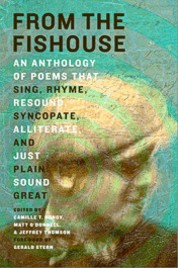 From the Fishouse: An Anthology of Poems that Sing, Rhyme, Resound, Syncopate, Alliterate, and Just Plain Sound Great
From the Fishouse: An Anthology of Poems that Sing, Rhyme, Resound, Syncopate, Alliterate, and Just Plain Sound Great
Camille T. Dungy, Matt O’Donnell, & Jeffrey Thomson (Editors)
Gerald Stern (Foreword)
Persea Books, April 2009
[nbsp]
Derived from the From the Fishouse Web site, a one-of-a-kind on-line archive devoted to the oral and aural aspects of contemporary American poetry, the From the Fishouse print anthology is a jamboree of poetry at its acoustic best. It collects over 175 poems by nearly a hundred poets from the archive, dividing them into ten playful thematic sections. Each poem is a striking example of why poetry is meant not just to be read, but read aloud.
[nbsp]
To complement the poems, the book includes illuminating excerpts from the Web site’s Q&As with the poets, and, in the Fishouse tradition of poetry as an oral/aural form, it comes with a compact disc that features dynamic recitations of 36 of the poems in the book.
[nbsp]
Indispensable for poetry lovers of any ilk, From the Fishouse is the most exciting, portable way to experience the array of poetry being written and performed in the United States in the first decade of the twenty-first century.
[nbsp]
Included are poems from Lindsay Ahl, Dan Albergotti, Kazim Ali, Lucy Anderton, Christian Barter, Curtis Bauer, Sherwin Bitsui, Rebecca Black, Adrian Blevins, Paula Bohince, Roger Bonair-Agard, Shane Book, Geoffrey Brock, Stacey Lynn Brown, Gabrielle Calvocoressi, Tina Chang, Suzanne Cleary, Mark Conway, Kyle G. Dargan, Chad Davidson, Oliver de la Paz, Anthony Deaton, Diana Marie Delgado, Matthew Dickman, LaTasha N. Nevada Diggs, Patrick Donnelly, Camille T. Dungy, Gibson Fay-LeBlanc, Monica Ferrell, Charles Flowers, Sarah Gambito, Ross Gay, Dobby Gibson, Kevin A. González, Rigoberto González, Kevin Goodan, Stuart Greenhouse, Sarah Gridley, Paul Guest, Matthea Harvey, James Hoch, Maria Hummel, Major Jackson, Tyehimba Jess, Amaud Jamaul Johnson, Ilya Kaminsky, Gillian Kiley, Ruth Ellen Kocher, Keetje Kuipers, Rodger LeGrand, Dana Levin, Sarah Lindsay, Reb Livingston, Anne Marie Macari, Sarah Manguso, Cate Marvin, Adrian Matejka, Charlotte Matthews, Sebastian Matthews, Leslie McGrath, Michael McGriff, Erika Meitner, Sarah Messer, Thorpe Moeckel, Aimee Nezhukumatathil, Kate Northrop, Sabrina Orah Mark, April Ossmann, Eugene Ostashevsky, Gregory Pardlo, V. Penelope Pelizzon, Jon Pineda, Hermine Pinson, John Poch, David Roderick, Patrick Rosal, Steve Scafidi, Ravi Shankar, Matthew Shenoda, Evie Shockley, Sean Singer, Tracy K. Smith, Laura-Gray Street, Jeffrey Thomson, Brian Turner, Anthony Walton, Camille-Yvette Welsch, Gabriel Welsch, Eliot Khalil Wilson, Suzanne Wise, and Douglas Woodsum.
[nbsp]
Praise for the anthology
Tomorrow’s poets create classics today with the group anthology From the Fishouse: An Anthology of Poems That Sing, Rhyme, Resound, Syncopate, Alliterate, and Just Plain Sound Great. Nearly two hundred poems by one hundred poets, it’s a fine catalogue of what the world of poetry can expect in the future from these excellent, aspiring stars…. From the Fishouse is a top pick for fans of poetry anthologies.
—Midwest Book Review
[nbsp]
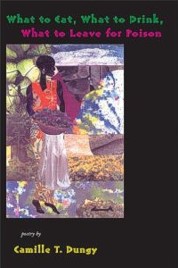 What to Eat, What to Drink, What to Leave for Poison
What to Eat, What to Drink, What to Leave for Poison
Red Hen Press, 2006
[nbsp]
In each section of What to Eat, What to Drink, What to Leave for Poison, the life experiences of individual Americans (family, famous, and infamous) serve as a frame of reference for exploring 20th century American life, specifically the role of race in the development and sustenance of personal relationships and aspirations. The book’s three sections are framed by sonnets which serve as meditations on certain disappeared and disappearing aspects of the natural world, reminding us that just as with family, authority, and urban spaces, conflicted relationships with plants, animals, and open spaces are an enduring legacy of our histories.
Awards
Finalist for the PEN Center USA 2007 Literary Award, and the Library of Virginia 2007 Literary Award
One of Small Press Distribution’s Top 25 Bestselling Books in 2006
[nbsp]
Praise for the collection
Dungy’s powerful first collection recognizes language . . . as a lifeline into the past: “Some notes/gather: the bank we map our lives around” (“Language”). For Dungy, human voices are the key: those of beloved family members, of people receding into the past, touched by segregation’s injustice and/or the currents of history. In “Before My History Class,” a child, preoccupied with the Bible, remarks, “When I die/I want to meet all the dead. They’ll be dressed/and acting just like they did when they lived,” to which her mother replies, “Someday you’ll be more careful what you wish.” Elsewhere, the past is generations removed, though immediate in imagination, as in “The Preachers Eat Out”: a white waitress shatters the plates of the black patrons she’s served, though one preacher has the last word: “Lady, my one regret/is that we don’t have appetite enough/to make you break every damned plate inside this room.” Dungy’s ear for spoken language is near-flawless, and her subtle, resonant shifts in voice are always striking. . .
—The Antioch Review
[nbsp]
Camille Dungy has a garden of verses that spring up with the sunshine or hide with you in the dusk. “Cleaning” best sums up What to Eat, What to Drink, What to Leave for Poison, an amazing poetry collection, when Dungy pens “understanding clearly/what is fatal to the body./I only understand too late/what can be fatal to the heart.” Take an ice tea and sit on the veranda or take a glass of wine and prop up in way you like your poetry, this book is a must.
—Nikki Giovanni
[nbsp]
Award-winning African-American poet Camille T. Dungy presents What to Eat, What to Drink, What to Leave for Poison, a collection of free-verse poetry about the vagaries of life, milestone marks, and common day-to-day observations, all narrated with a down-to-earth flavor and a unique gift for succinctly shaping emotion into the briefest of stanzas. A colorful collection that both revels in the joys of life and mourns its tragedies.
—Midwest Book Review
[nbsp]
Camille Dungy knows where she comes from. What to Eat, What to Drink, What to Leave for Poison is one of those family dinners where, hours later, everyone is still talking across the table. But, as in every family, things are complicated. Here, beneath overt sweetness, lurks covert rebellion. Which is just another way to say that these poems have both heart and irony. This is a fine first book.
—Lola Haskins, author of Desire Lines (Boa Editions)
[nbsp]
In the title sequence of What to Eat, What to Drink, What to Leave for Poison, Camille Dungy invites her readers to “taste/what the world has to offer.” It is a tall order and the author herself leads by example and fulfills it marvelously, offering a stunning first collection that is both sweet with the richness of life and laced with the bitterness of knowledge. Through lyrics, portraits, narratives, and monologues, she explores the intricate relationship between her own family and the human family, personal history and American history, the human world and the ways humans have treated the Earth. What to Eat, What to Drink, What to Leave for Poison, is a work of sweep, breadth, and abundance–a major and magnificent book.
—Stuart Dischell, author of Dig Safe (Penguin)
[nbsp]

